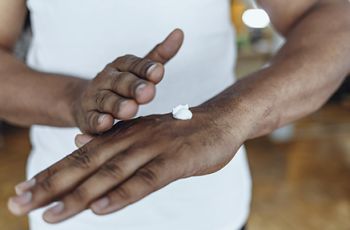“Is this going to be on the final?” Mykia Washington eagerly asked her instructor during a fierce round of math Jeopardy. It’s an unusual question to hear from the mouth of a 14-year-old on a mid-summer morning, the sun already beating down on a sweltering Foggy Bottom. But for Washington, a rising sophomore at Woodrow Wilson Senior High School, and 36 of her peers, it’s been an unusual summer.
The students, who hail from 16 different Washington, D.C. public high schools, are participants in the Upward Bound (UB) summer residential program, which has been hosted at the George Washington University School of Medicine and Health Sciences (SMHS) annually since 1999.
As one of eight Federal TRIO Programs designed by the U.S. Department of Education to serve students from low-income families, UB provides support to participants in their preparation for college entrance. UB runs throughout the academic year as well, but the summer residential program is perhaps its most influential component.
Between June 25 and August 3, the students got a glimpse of college life at GW. They attended classes – math, laboratory science, English literature and composition, and Spanish language and culture – in SMHS buildings, dined in the hospital cafeteria, and spent two weeks living in Thurston Hall, a dormitory that houses upwards of 1,100 freshman during the academic year.
The students cite living in the dorms and their weekly Friday off-campus activities – which this year included a lecture at NASA headquarters by electrical engineer Chante Hill, zipliningat the Adventure Park in Sandy Springs, Md., and an ‘80s hip hop dance workshop facilitated by a former GW dance team member– as their favorite aspects of the UB summer program, but they also recognize the academic benefits. “You get exposed to new stuff,” says Diani Corbett, a rising junior at the Washington Mathematics Science Technology Public Charter High School. “You know how in the summertime you can forget a lot of what you do during the school year? UB keeps you refreshed and prepared,” she says.
In addition to readying the students for upcoming school year, UB also equips them for life beyond high school. “We’re always looking towards the future,” says Ivy DeShield, Director of Upward Bound at GW. “Anything from SAT prep to career workshops to college tours,” like the one the summer program took to North Carolina during the last week of July, where they visited Elon University, North Carolina State University, North Carolina A&T State University, Wake Forest University, William Peace University, and the University of North Carolina at Chapel Hill.
DeShield stresses the importance of the students’ commitment to the program as a factor of its success. “We bring the tools and resources, and then you need to come back with the energy and effort ,” she tells students, who are tracked for six years after high school graduation, at which point they are expected to have graduated from college.
One clear indication of the high level of commitment amongst UB participants is the number of students who come back year after year, some who later serve as tutor counselors – the UB term for residential assistants and academic tutors – and even instructors. Benta Davis, a 23-year-old D.C. native, is one such “UB lifer.” She was a student in the program for her four years of high school, became a tutor counselor during college, then, after graduating from Bowling Green State University in Ohio with a degree in international relations and Spanish, returned this summer as the Spanish language and culture instructor.
Davis, whose background is similar to that of many of her students, sees herself as a mentor. “I try to connect with the students both inside and outside of the classroom” she says. “I encourage them to study abroad in college like I did, and remind them how important the relationships they build at UB will be throughout their lives.”
For Lakeyta Smith, a math teacher at Whitman Middle School in Fairfax County, spending the summer as a UB instructor is a chance to give back to the community. She credits her own teachers with her success in math, and wants to help other young women, especially minorities, find success in the STEM fields. “I want them to see that they can do it, too,” Smith says.
Smith sees continuity as the greatest benefit for students who spend the summer at UB. It’s a benefit that has been particularly crucial in light of the recent overhaul of the D.C. public school system, during which a number of high schools were closed due to poor performance, low enrollment, and funding gaps. DeShield echoes that sentiment and says that UB has attempted to be a part of the “clean-up crew” that has assisted the affected students.
In addition to $1.25 million in funding from the Department of Education for its next five years of operation, UB received a $40,000 grant from the D.C. Children and Youth Investment Trust Corporation (CYITC) in April to help run this year’s summer program. Yolanda Haywood, M.D., Associate Dean for Student and Curricular Affairs at SMHS and principal investigator for Upward Bound, says that "without this funding, it would be impossible to conduct such a rich and robust program for these students."
Late on a Thursday afternoon in July, two dozen high school students were gathered in a classroom on the otherwise deserted second floor of Ross Hall. They assembled in small groups around contraptions with names like “Feel the Heat,” “Sneaky Snacks,” and “Heavy Lifting.” The students were finalizing science projects which, thanks to STEM research funding from NASA, they had been able to perfect during the summer.
In the far corner of the room, Michel Gakpara, a rising sophomore at Roosevelt Senior High School, tested the pulley system his group had built. Gakpara, who moved to the U.S. from Togo, a small West African country, less than a year ago, beamed as he delicately raised and lowered a crate of eggs. “Just a few weeks ago, Michel wouldn’t say a word,” said Ellis Hartridge, a tutor counselor who has worked closely with Gakpara. “And now he’s smiling and laughing. It’s been incredible to watch him open up and thrive in this environment,” Hartridge said.


